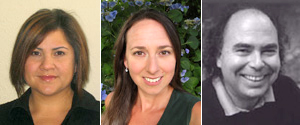Three UC Berkeley researchers receive NIH 'innovator' awards
Three University of California, Berkeley, faculty members have been singled out as innovators by the National Institutes of Health (NIH) and will receive special grants designed to fund "transformative research" that could lead to major advances in medical science.
Diana Bautista, assistant professor of molecular and cell biology, and Amy Herr, assistant professor of bioengineering, will receive New Innovator Awards, which are designed for young researchers who have not previously received funding from the NIH and who are taking a different, "high risk, high payoff" approach to biomedical problems. The awards come with $1.5 million over five years. The awards were announced on September 30, 2010 by NIH Director Dr. Francis Collins at the Sixth Annual NIH Director's Pioneer Award Symposium in Bethesda, Md.
Donald C. Rio, professor of molecular and cell biology, will receive a EUREKA award from the National Institute of General Medical Sciences, one of the NIH's 27 institutes and centers. The award, one of 21 announced September 2, 2010, provides scientists with direct costs of approximately $200,000 per year for up to 4 years.

Bautista, who joined the UC Berkeley faculty in 2008, will use a unique creature, the star-nosed mole, to begin searching for genes turned on by the touch and pain receptors in our skin. The mole's snout is ringed by extremely sensitive, fleshy appendages which appear to have no pain receptors. This will allow Bautista and her team to isolate the effect of touch receptors from pain receptors, she said.
"We've developed a new approach that will allow us to identify genes that haven't yet been implicated in touch and pain," she said.
What she finds could have implications for cancer patients, who sometimes develop extreme sensitivity to touch, and diabetes patients, who often develop a neuropathy that eliminates their sensitivity to light touch.
Herr, who came to UC Berkeley in 2007, will use an innovative technology that combines approaches from engineering, chemistry, materials science and systems biology to support her research into utilizing proteins as disease markers.
"It is notoriously difficult to study proteins as disease biomarkers because of the diverse and dynamic nature of protein signaling," said Herr. "The vast majority of measurement techniques used now are slow and labor-intensive. The technology can form a bottleneck. We are harnessing microfluidics to design fast, automated – and even quantitative – assays to map protein signaling like never before in diseases including cancer and autoimmune dysfunction."
Her long-term goal is to develop highly specific diagnostic, prognostic and treatment-monitoring tools based on disease state information encoded in protein biomarkers.
"In the end, we seek to advance predictive and personalized medicine through diagnostic tests that are unimaginable today," said Herr.
Rio, who has been on the faculty since 1992, will develop a new biochemical technique to purify forms of RNA that have never been isolated before: so-called pre-messenger RNA from individual genes. Normally, genes – complete with their "junk DNA" inserts, called introns – are transcribed into pre-messenger RNA, the junk sequences are cut out and the RNA is spliced back together as messenger RNA (mRNA). This mRNA then exits the nucleus and is taken into the ribosome, where it's translated into protein.
The protein nanomachine, called the spliceosome, that cuts and resplices pre-messenger RNA is well-known, but not so the constellation of proteins that bind to a given pre-messenger RNA from a single gene. Rio hopes to find the protein hangers-on that tell the spliceosome where to bind.
"We want to purify endogenous single-gene transcripts of pre-messenger RNA with the proteins bound to it, which is something no one has done before because it's technically difficult," Rio said. "But exploring new territory has the potential to reveal something interesting, and potentially useful."
